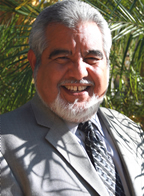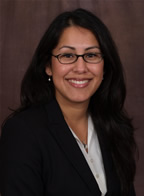Accolades From National Organization
Abrego and Perez Win American Association of Hispanics in Higher Education Awards
December 17, 2007
By Mimi Ko Cruz
For their contributions to education, Silas H. Abrego, associate vice president for student services, and Patricia A. Perez, assistant professor of Chicana and Chicano studies, will be feted by the American Association of Hispanics in Higher Education (AAHHE) in March.
Abrego will receive the association’s Alfredo G. de los Santos Jr. Distinguished Leadership in Higher Education Award and Perez will receive the AAHHE’s Outstanding Dissertation Award. The honors will be presented March 8 at AAHHE’s third national conference in Miami.
Silas H. Abrego
A member of the campus community since 1985, Abrego oversees nine student affairs programs, including Ronald McNair Scholars and Upward Bound. He leads efforts to provide scholarships and educational enhancement programming for low-income and first-generation students, and is involved in many statewide advisory boards and committees.
“Dr. Abrego has worked tirelessly to enrich the educational experience of quality of services for students in general and Hispanic students specifically,” Robert L. Palmer, vice president for student affairs, wrote in his nomination letter for Abrego. “Despite the barriers he faced as a Latino, he earned bachelor’s and master’s degrees, as well as a doctoral degree. The cornerstone of his career in education is program development with an emphasis on preparing young people to succeed in higher education. He is especially interested in helping low-income and underrepresented students, who would otherwise not pursue or begin a higher education.”
The son of farm workers with no higher than a grammar school education, Abrego was the first in his family to earn a college degree. He had no role models. He remembers that back in high school, teachers and administrators told him Latinos had two options upon graduation: join the military or find a manual job.
“They never had any hope for us,” recalled Abrego, who chose the Army and served as a paratrooper with the 173rd airborne brigade based in Okinawa, Japan. He served from 1963 to 1965.
Once discharged, Abrego found a job as a construction worker but, similar to when he worked summers picking grapes as a child, couldn’t stand being on his feet under a blazing sun all day.
So, he decided to earn an associate’s degree in machine technology, with the goal of becoming a high school shop teacher. Once he started studying, his ambition changed. He earned his doctoral and master’s degrees in higher education, governance and management from USC.
“I never knew I would love learning until I went to college,” said Abrego. “No one expected me to. That’s why I decided to work to create higher education access and retention programs for people like me. I want to ensure access to higher education for anyone who desires it.”
Patricia A. Perez
Perez, who joined the faculty last year, received her doctorate and master’s degree in higher education and organizational change from UCLA.
Her dissertation focused on Chicana and Chicano college choice. Titled “Social Capital and Chain Migration: The College Choice Process of Chicana and Chicano Community College, Transfer and University Students,” it defines college choice as “the entire spectrum beginning with the predisposition for college, all the way through to the matriculation to a specific higher education institution and the factors behind that selection,” Perez said.
“For my qualitative study, I looked at the college choice process for first-generation, college-going Chicana and Chicano students — 10 at a community college, 10 transfer students, and 10 university students — with an equal gender balance,” she said.
“I decided to research this topic for several reasons,” said Perez. “First, the traditional college choice models that exist do not reflect the Chicana and Chicano student experience well. In fact, the existing college choice models do not speak to the transfer student experience at all. Given most Chicana and Chicano students begin their postsecondary careers at a community college, this was a research gap that needed to be addressed.”
Perez said she wanted to document the transfer college choice process and develop a theoretical framework that considers the transfer student population.
“The bulk of the literature on college choice is quantitative and the scholarship on Chicana and Chicano students favors Chicanas,” she said. “I wanted to contribute to a more holistic understanding of the Chicana and Chicano college choice process by incorporating both men and women using qualitative methodologies.”
She is incorporating parts of her dissertation research into her classes that discuss Chicana and Chicano education issues.
As part of her award, she will receive a $5,000 and travel expenses to AAHHE’s conference where she will present her research.


